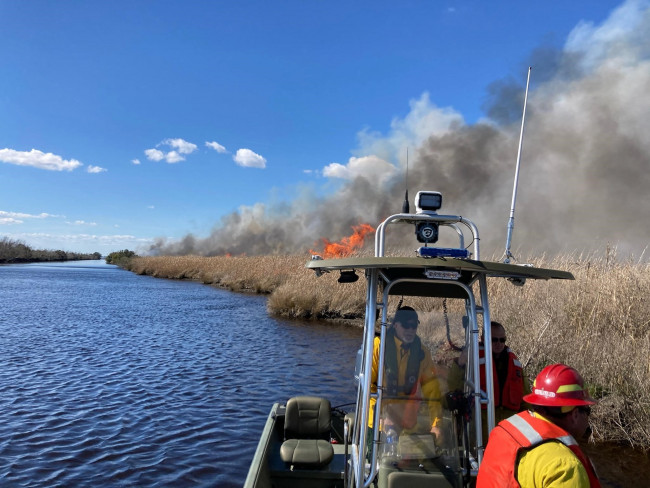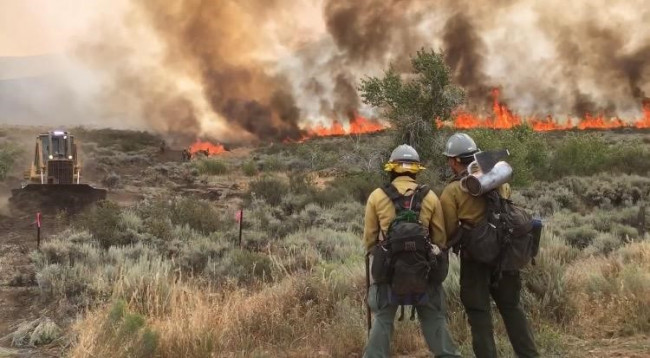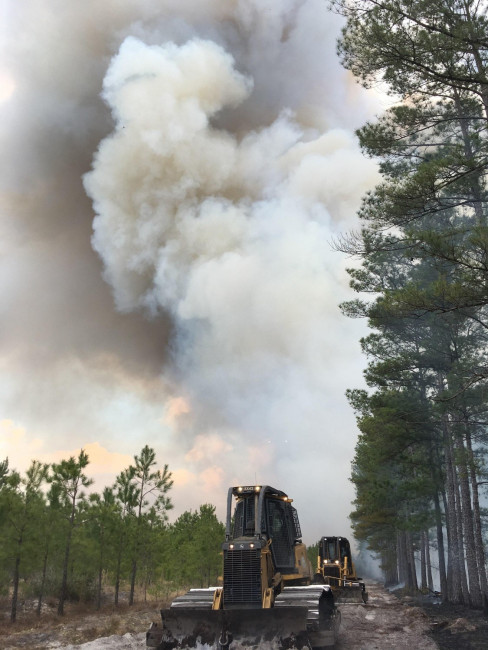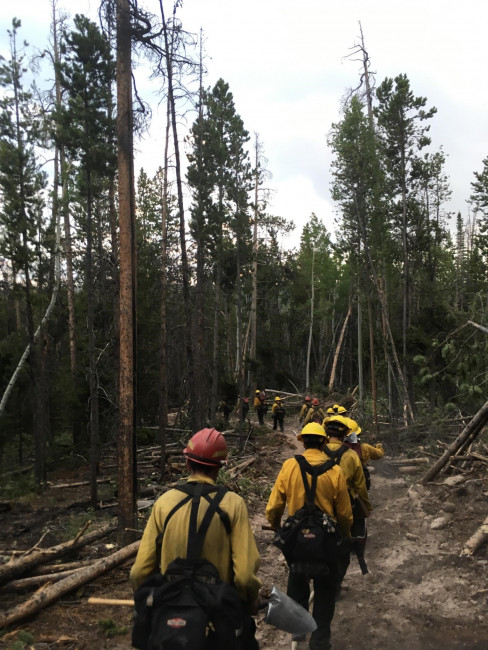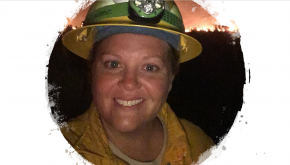
By Lauren Larsen, Natural Resources Educator, Wisconsin
Can you tell me about your work in forestry and in wildfire?
I’ve been in forestry and wildfire since 2008 when I finished my Masters in Forest Management from Virginia Tech. The beginning of my career focused on writing management plans and practicing silviculture in the coastal plain of North Carolina. So when I started in forestry, I knew nothing about fire. However, because of the unique timber and soil types I was working in, I was immediately thrown into wildfire.
I started out with no experience and built up to Heavy Equipment Boss/Prescribed Burn Boss 2 Trainee. Right now, I assist the Station Forester on Marine Corps Air Station Cherry Point where I am in charge of the wildland fire program. Lately I’ve been more heavily into forestry, but it’s fire season now so last week I got out on a prescribed burn. What I love about the flexibility of my job is that I can walk away from timber cruising and go right into wildfire!
What first got you interested in wildfire?
I went to school in the mountains of Virginia and I remember what they called Black Sunday in 2007. I was driving home, and the mountains were on fire everywhere around me. I knew that we need fire for so many different things in forestry. It’s a tool in the toolbox, and it was one that I didn’t know much about because we didn’t ever use it in southern Virginia.
When I first started in fire in 2008, North Carolina was in the midst of an ongoing large wildfire event, and initially I felt completely useless. I sat in the operations room and answered the phone while the guys were out on the fire, day in and day out. It was only later on that I realized I was an essential part of the equation, dispatching needed equipment. After that, I took S-130/190 as soon as I could so I could be on a Type 2 hand crew.
It is an adrenaline rush the first time you get to go on a prescribed burn. 2011 was when I really got hooked on prescribed burning and wildfire. I was lucky to be on engine strike teams, walking behind dozers and burning out, and I was also on an incident management team.
What keeps you coming back every year?
When I take a step back and consider it, it’s the people that I’m on fires with who make every fire the best fire. I’ve been lucky to work on fires in most of the western states, and the people made it something that I didn’t want to quit. You build those amazing connections working towards a common goal together. I have a fire family, and one of the greatest things about it is that race, gender, or any of that stuff—none of that matters. We would all jump right in and help each other out. I’ve met some amazing people that I still talk to frequently. I had people calling to check on me from all over the country when Hurricane Florence hit, and it’s really comforting to know that they’ve got your back.
Another great part about fire is when you understand the science behind fire and the vegetation. Being a forestry nerd, I got to see things I never thought I’d get to see. I’m from the land of the longleaf pine and am fascinated by the interconnectivity between fire and ecosystems. Every fire will show you how small changes in weather, conditions, and vegetation (fuel) change the landscape. I’ve gotten to experience the drastic differences between wind-driven wildfires in the sage of Nevada or the Douglas fir and ponderosa pine torching and crown fires in Washington. The people and the desire to learn more keep bringing me back.
In your experience, are crews gender-balanced or do they tend to be male-dominated?
In my experience, it has been heavily male-dominated except for one crew I saw in California that was pretty balanced. As a woman, you’re in the minority at almost every event you go to and you have to understand how to deal with issues. I was the only female on the two hand crews I went out on and have only had one issue. I am a very strong-willed person and very vocal, so when an issue came up I let the crew member know I wasn’t going to allow sexist treatment.
Have you faced any challenges specifically as a woman in wildfire?
I was a heavy equipment boss in Washington where they had an established incident management team. During role call when they called “Heavy Equipment Boss Hendrick” and I said “Here”, I saw fifty heads turn around and look at me. I think they heard my southern accent combined with a female voice and were in a little bit of shock.
Being a female who’s happy go lucky and bubbly, I don’t think men know what to do with that. Breaking through that barrier was challenging because Heavy Equipment Boss Hendrick is bubbly and happy but has 10+ years’ of heavy equipment experience and grew up on a farm operating tractors. It was challenging to get them to see that yes, I know what the fire is doing, I understand your firefighting tactics, I can get this job done—all while having my own personality that was different from those of many of the men around me. What I learned, though, was that my personality helped ease tensions whether on hand crews or in a task force, which I think was an advantage.
Speaking of advantages, what are some advantages of being a woman in wildfire?
I’ve had many division supervisors tell me that women take direction more easily and accomplish the job better than most men will. For one thing, I’m going to ask questions when I don’t understand an instruction. I often get the work done better and faster, and I’ve gotten to stay on assignments longer than some of my counterparts because of that. One of the advantages—and I don’t mean this in a bad way—is that I don’t carry the ego that men tend to carry.
Did you have any mentors or role models that helped you along the way?
My first real mentor was a professor, and the only female professor in our department at the time. I think they always gave her the female students to mentor. And I was one of three female students in a graduating class of about thirty. She was my mentor and advisor, and she was very real with us. She told us, “I’m not going to go out of my way to keep you in line; you’re an adult and these are the expectations. But if you have a problem, by all means come to me.” I appreciated the fact that she didn’t pull us aside and treat us like we were dainty, fragile people.
My mentor after graduation was a man who I still talk to once or twice a week, and I think the world of him. He is a genuinely intelligent person, very even keel, and actively listens. And I think active listening is one of the hardest things for a lot of people. In terms of having a good mentor, you have to be open to constructive criticism on both ends of listening and giving. He’s still a huge part of my life.
You mentioned it came full circle when your mentors asked you to talk with some of their female students. Do you think mentorship for women in forestry and fire is important?
I think it’s huge. In my time with the state, I was one of the only female foresters at a higher level. I had young ladies from across the state that I would talk to on a regular basis because they were dealing with ridiculous issues. It has helped me be a better forester and a better firefighter because I have to reflect on my own leadership with questions like: Am I excluding anyone? Is what I’m saying making anyone feel a way that isn’t productive? I still talk to those girls, and even the ones who aren’t in forestry still come to me. If I can help in any way, it makes it worth it for me to be a mentor.
What are some of your most memorable experiences working with wildfire?
In the state of North Carolina, some of my most memorable experiences have been on initial attack. I will never forget crossing a high-rise bridge and seeing a fully developed smoke column at 8am about 25 miles south of the bridge. I will never forget the adrenaline rush and surge of energy I had, because I was excited but terrified. Things changed quickly, and the fire was rapidly exploding because it was a unique weather day. Locally we are impacted by land and sea breezes. We had a red flag warning and a special wind called a “Brotak wind profile”, which we knew was going to happen but we didn’t expect that early. The smoke column punctured the lowest level of the atmosphere, sending embers one way while the surface level winds were going the opposite direction. It was memorable, unreal weather that I had never experienced, and fire was literally everywhere. That fire jumped a four-lane highway; it was just chaos. Later that night we had super fog (fog and smoke combined), and you couldn’t see two feet in front of you. That’s one of the unusual things that I will never forget.
I have also been walking behind a bulldozer out west and seeing some of the most beautiful, unusual stuff. It’s kind of a double-edged sword because in a way I’m plowing a line through some really old trees that are about to be burned up, but you get to experience nature in a way most people wouldn’t normally get to.
What would you say to younger women interested in a career in wildland fire?
The first thing is to not be afraid to go after what you want. Set your eye on the prize and don’t give up. Hold true to what’s in your heart. Different agencies will try to pigeonhole you really early in your career and it’s very frustrating. In my personal experience, I felt that because I was a woman I was shoved into a Documentation Unit Leader position that I didn’t want to be in, and I had little say in it. I tried to get moved to logistics where I could be more active, and they absolutely refused to let me move. But I never gave up on the positions I wanted, and eventually I got there. In wildland fire the hard part is that it just takes time. Sometimes it takes years to get the qualifications and experience you need to move into the position you want.
Being flexible is huge if this is something you want to get into. When I started, I was flexible enough to drop everything and go out west, or to take other jobs that required moving, in order to get that experience that helped me move forward.
I would also say that it’s not a culture that is always inviting. There are going to be days that it’s not the most conducive atmosphere to things women deal with, and you need to be bullheaded enough to not take things personally. It’s very hard to not take things personally in your work when you have a pride and a passion in it, but you have to try not to. Accepting that not every day is going to be a good day makes things easier to process. Be hardheaded but flexible and you can make it happen.


